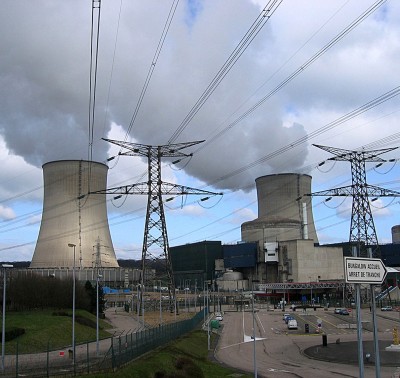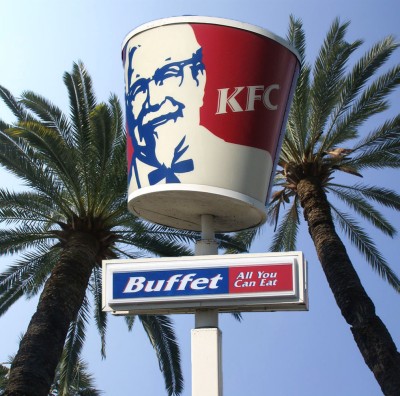
Reprocessing nuclear waste—practiced in France and several other countries but not in the U.S. where it was invented—involves breaking down spent nuclear fuel to recover material for use in new fuels. Proponents say it reduces the amount of nuclear waste, resulting in less highly radioactive material that needs to be stored safely. Pictured: France's Cattenom nuclear power station. (Photo: Toucanradio, courtesy Flickr)
Dear EarthTalk: Why don't we reprocess and re-use our nuclear waste like France does? Would it be possible for us to start doing so? -- Albert Jukowsky, Silver Spring, Md.
Reprocessing nuclear waste to extract more energy from it, while expensive and controversial, is indeed to this day still practiced in France, the UK, Russia, India and Japan-but not in the United States, where it was invented. The process involves breaking down spent nuclear fuel chemically and recovering fissionable material for use in new fuels. Proponents tout the benefit of reducing the amount of nuclear waste, resulting in less highly radioactive material that needs to be stored safely.
Nuclear reprocessing was first developed in the U.S. as part of the World War II-era Manhattan Project to create the first atomic bomb. After the war, the embryonic nuclear power industry began work to reprocess its waste on a large scale to extend the useful life of uranium, a scarce resource at the time. But commercial reprocessing attempts faltered due to technical, economic and regulatory problems. Anti-nuclear sentiment and the fear of nuclear proliferation in the 1970s led President Jimmy Carter to terminate federal support for further development of commercial reprocessing. The military did continue to reprocess nuclear waste for defense purposes, though, until the collapse of the Soviet Union and the end of the Cold War made continuous ramping up of our nuclear arsenal unnecessary.
More recently, George W. Bush pushed a plan, the Global Nuclear Energy Project (GNEP), to promote the use of nuclear power and subsidize the development of a new generation of "proliferation-resistant" nuclear reprocessing technologies that could be rolled out to the commercial nuclear energy sector. Federal scientists came up with promising spins on reprocessing nuclear fuel while minimizing the resulting waste. But in June of 2009 the Obama administration cancelled GNEP, citing cost concerns.
Proponents of nuclear power-and of reprocessing in particular-were far from pleased with GNEP's axing, especially in light of Obama's earlier decision to close Yucca Mountain as the U.S.'s future nuclear waste repository. "GNEP may have gone away, but the need to recycle spent fuel in this country is more important than ever because of the government's stupid decision to close Yucca Mountain," said Danny Black of the Southern Carolina Alliance, a regional economic development group, on the Ecopolitology blog. "Without Yucca Mountain, the pressure is on the industry to do more with recycling."
But a 2007 report by the nonprofit Institute for Energy and Environmental Research (IEER) would seem to justify Obama's decision. IEER found that nuclear reprocessing would actually increase our volume of nuclear waste six fold. IEER also reported that France, which runs the world's most efficient reprocessing operation, spends about two cents per kilowatt hour more for electricity generated from reprocessed nuclear fuel compared to that generated from fresh fuel. IEEE further reports that the costs to build the breeder plants needed to convert spent nukes into usable fuel would "create intolerable costs and risks."
For now, U.S. nuclear plants will continue to store waste on site, with spent rods cooled in pools of water for upwards of a year and then moved into thick steel and concrete caskets. While proliferation and terrorism have long been risks associated with hosting nuclear plants on American soil, recent events in Japan underscores that even Mother Nature poses a threat. As such, advocates of reprocessing probably stand little chance of reviving plans in a political climate now so hostile to nuclear development.
CONTACTS: Ecopolitology, www.ecopolitology.org; IEER, www.ieer.org.

YUM! Brands, which operates 38,000 fast food restaurants in 110 countries (including KFC, Pizza Hut, Taco Bell, WingStreet, A&W and Long John Silver's), continues to ignore calls from some environmentalists to stop sourcing palm oil, paper and other goods from suppliers notorious for destroying tropical rainforests in Indonesia and elsewhere, according to E - The Environmental Magazine. Indonesia's tropical rainforests are home to orangutans, tigers, elephants, clouded leopards and dozens of other endangered plants and animals. (Photo: Marufish, courtesy Flickr)
Dear EarthTalk: I understand that fast-food giant YUM! Brands, owner of KFC, is under fire by Greenpeace and others for rainforest destruction. What's the story? -- Betsy Barnard, Wellesley, Mass.
YUM! Brands, which operates 38,000 fast food restaurants in 110 countries (including not only KFC but also Pizza Hut, Taco Bell, WingStreet, A&W and Long John Silver's), has come under fire of late from Greenpeace and other rainforest advocacy groups for sourcing palm oil, paper and other goods from suppliers notorious for destroying tropical rainforests in Indonesia and elsewhere. While McDonald's and Burger King have worked in recent years to cut their ties with palm oil and logging companies linked to rainforest destruction, YUM! continues to ignore calls to source their resources more responsibly.
Indonesia's tropical rainforests are home to orangutans, tigers, elephants, clouded leopards and dozens of other endangered plants and animals. Environmentalists report that 40 percent of Indonesia's rainforests have been logged over in the last half-century, mostly to clear the way for palm oil plantations. The cleared timber is sold at huge profits for paper and pulp, while the palm oil brings in continuous revenue for multinational corporations despite denuding lands once rich in biodiversity.
Tropical rainforests also sequester significant amounts of carbon dioxide (CO2) in their growing woody biomass; chopping them down only accelerates the rate of global warming by allowing more CO2 to escape into the atmosphere where it contributes to the greenhouse effect. Despite a partial moratorium on rainforest destruction announced by the Indonesian government in May 2011, analysts believe that nearly half of the country's remaining tropical rainforests will be cleared within two decades.
Over-exploitation of natural resources-and deforestation in particular-is a huge obstacle to Indonesia's growth. According to the Rajawali Institute for Asia at the Harvard Kennedy School of Government, by eliminating its natural capital for negligible gains, Indonesia lost $150 billion in future revenues between 1990 and 2007, wiping out one-third of the country's national savings in the process.
There are "major economic risks for Southeast Asia's agriculture and timber sectors if they don't take prompt action to conserve their forests," reports Glenn Hurowitz, senior fellow at the Center for International Policy. "Global consumers are increasingly demanding deforestation-free products," he says, adding that Nestle, McDonald's, Unilever and others have pledged to obtain their palm oil from sources certified "sustainable" by the Roundtable on Sustainable Palm Oil.
YUM! Brands is not the only alleged offender. Greenpeace has also targeted Mattel toys for supporting suppliers that contribute to Indonesian deforestation. And two Michigan girl scouts were shocked to find out the cookies they were selling contained palm oil obtained from deforested land in Indonesia. They spread the word to fellow girl scouts across the country, thousands of whom have stopped selling cookies as a result.
Concerned consumers should write the company a letter asking them to stop using products derived from deforested rainforest lands. Greenpeace makes it easy by hosting an online form letter that sympathizers can sign onto and the group will take care of delivering your message directly to YUM! executives.
CONTACTS: YUM! Brands, www.yum.com; Center for International Policy, www.ciponline.org; Roundtable on Sustainable Palm Oil, www.rspo.org; Greenpeace Form Letter to YUM!, https://secure3.convio.net/gpeace/site/Advocacy?cmd=display&page=UserAction&id=689.
EarthTalk® is written and edited by Roddy Scheer and Doug Moss and is a registered trademark of E - The Environmental Magazine (www.emagazine.com). Send questions to: earthtalk@emagazine.com.
The opinions expressed in this commentary are those of their respective authors and do not necessarily represent the opinions of somd.com.


